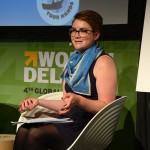WASH Wednesday at 2016 Women Deliver
May 19, 2016
Wednesday morning at Women Deliver started early with a breakfast lunch hosted by WaterAid, the UN Foundation, and Intrahealth that posed the provocative question: “Would you give birth without clean water, soap and a toilet?” At this session, panelists addressed the lack of access to water, sanitation, and hygiene (WASH) that is the reality in far too many healthcare facilities around the world and the impact this has on helping babies have a Healthy Start.
At the outset of this session, Dr. Luwei Pearson, the Deputy Director for the Health Section at UNICEF stated that poor WASH in healthcare facilities is due to the healthcare system not prioritizing WASH. As mentioned in Tuesday’s blog, WASH’s prominence in delivering health is increasingly recognized, so I am hopeful that this momentum will continue. However, it is important to remember that the onus to deliver WASH in healthcare facilities is not on the government alone. Civil society and the government both have a shared responsibility.
Later in the day on Wednesday, I was honored to join a panel organized by the USAID WASHplus project, which is located at FHI 360. This panel, which looked at the role of WASH in women’s and girls’ health and wellbeing,
Amrita Gyawali, with the Karuna Foundation in Nepal, spoke passionately about the need for inclusive WASH. It is essential that WASH delivery for “everyone, everywhere” also meet the needs of individuals with disabilities. During her presentation, Amrita showed a powerful film, developed by WaterAid Nepal, which gave the audience an intimate look into the barriers that people with disabilities face in attempting to access WASH facilities.
Her presentation was followed by one from Ephraim Kisangala, a Women Deliver Young Leader and medical doctor. He introduced the topic of menstrual hygiene management and outlined why men should be champions for menstrual hygiene. He noted that medical doctors have a place of authority within his community in Uganda. As such, it is important that doctors have accurate information about menstruation and are vocal advocates for menstrual hygiene both amongst their patients and the community at large.
I also had the opportunity to speak about handwashing and the PPPHW’s efforts for handwashing  advocacy. The session was concluded by commitment making, some of which are outlined here:
advocacy. The session was concluded by commitment making, some of which are outlined here:
- I commit to engage all my civil engineering colleagues to better think about people with disabilities when designing public buildings or public spaces.
- I’ll explore how to start doing Menstrual Hygiene Management (MHM) through education programs
- I’m going to include WASHplus resources when I teach my midwifery students about handwashing.
For my part, this session helped me realize that our materials can, and should, be more inclusive. As we work to update the Global Handwashing Day Planner’s Guide, we will work to address this gap.
Overall, I’ve been pleased with the presence of WASH at Women Deliver, and I look forward to conversations and commitments coming together on the final day.